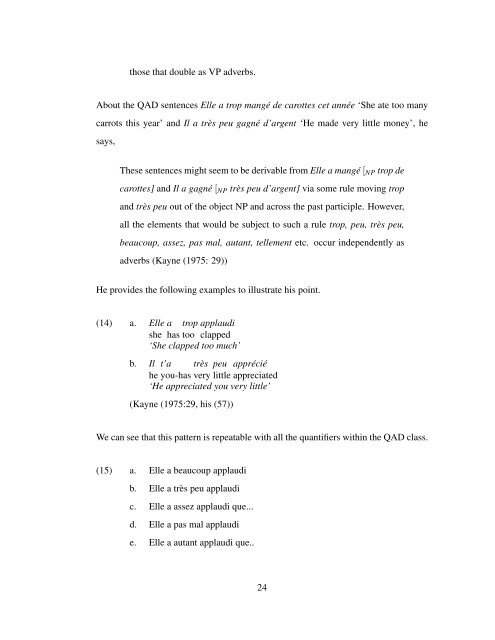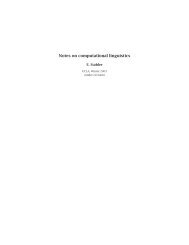Formal Approaches to Semantic Microvariation: Adverbial ...
Formal Approaches to Semantic Microvariation: Adverbial ...
Formal Approaches to Semantic Microvariation: Adverbial ...
You also want an ePaper? Increase the reach of your titles
YUMPU automatically turns print PDFs into web optimized ePapers that Google loves.
those that double as VP adverbs.<br />
About the QAD sentences Elle a trop mangé de carottes cet année ‘She ate <strong>to</strong>o many<br />
carrots this year’ and Il a très peu gagné d’argent ‘He made very little money’, he<br />
says,<br />
These sentences might seem <strong>to</strong> be derivable from Elle a mangé [ NP trop de<br />
carottes] and Il a gagné [ NP très peu d’argent] via some rule moving trop<br />
and très peu out of the object NP and across the past participle. However,<br />
all the elements that would be subject <strong>to</strong> such a rule trop, peu, très peu,<br />
beaucoup, assez, pas mal, autant, tellement etc. occur independently as<br />
adverbs (Kayne (1975: 29))<br />
He provides the following examples <strong>to</strong> illustrate his point.<br />
(14) a. Elle a trop applaudi<br />
she has <strong>to</strong>o clapped<br />
‘She clapped <strong>to</strong>o much’<br />
b. Il t’a très peu apprécié<br />
he you-has very little appreciated<br />
‘He appreciated you very little’<br />
(Kayne (1975:29, his (57))<br />
We can see that this pattern is repeatable with all the quantifiers within the QAD class.<br />
(15) a. Elle a beaucoup applaudi<br />
b. Elle a très peu applaudi<br />
c. Elle a assez applaudi que...<br />
d. Elle a pas mal applaudi<br />
e. Elle a autant applaudi que..<br />
24
















